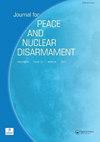Japan’s Reliance on US Extended Nuclear Deterrence: Legality of Use Matters Today
IF 1.4
Q4 INTERNATIONAL RELATIONS
引用次数: 1
Abstract
ABSTRACT Japan declares in its security policy that US extended nuclear deterrence is “essential”. However, policymakers do not seem to have provided sufficient explanation of the legality and the implications of the use of nuclear weapons, even if they argue that the policy of extended nuclear deterrence is essential. From the perspective of international law, three questions can be identified in examining Japan’s reliance on the US extended nuclear deterrence. The first is what the target would be in an anticipated use of nuclear weapons, a question that relates to policymakers’ understanding of nuclear deterrence. The second is whether the civilian population is a permissible target for belligerent reprisals; this question relates to the legality of countervalue strategy targeting an adversary’s cities and civilians as intolerable punishment. The third is whether countermeasures by a third party on behalf of an attacked state are permissible, a question that relates to the legal basis of Japan’s reliance on the US nuclear capabilities. These questions at the nexus of politics and law have been neither addressed in depth in deliberations in the National Diet of Japan nor examined sufficiently in scholarly research. This article addresses these questions and considers the legal challenges and the implications today that are inherent in Japan’s security policy, which relies on US extended nuclear deterrence.日本对美国扩大核威慑的依赖:今天使用核武器的合法性很重要
摘要日本在其安全政策中宣称,美国扩大核威慑是“必不可少的”。然而,政策制定者似乎没有充分解释使用核武器的合法性和影响,即使他们认为扩大核威慑政策至关重要。从国际法的角度来看,在考察日本对美国扩大核威慑的依赖时,可以发现三个问题。第一个问题是预期使用核武器的目标是什么,这个问题与决策者对核威慑的理解有关。第二个问题是,平民人口是否可以成为交战报复的目标;这个问题涉及到以对手的城市和平民为目标的反价值战略作为不可容忍的惩罚的合法性。第三个问题是是否允许第三方代表受攻击国家采取反措施,这个问题与日本依赖美国核能力的法律基础有关。这些关于政治和法律关系的问题既没有在日本国会的审议中得到深入解决,也没有在学术研究中得到充分审查。本文讨论了这些问题,并考虑了日本安全政策所固有的法律挑战和当今的影响,该政策依赖于美国的扩展核威慑。
本文章由计算机程序翻译,如有差异,请以英文原文为准。
求助全文
约1分钟内获得全文
求助全文
来源期刊

Journal for Peace and Nuclear Disarmament
INTERNATIONAL RELATIONS-
CiteScore
1.30
自引率
0.00%
发文量
36
审稿时长
12 weeks
 求助内容:
求助内容: 应助结果提醒方式:
应助结果提醒方式:


